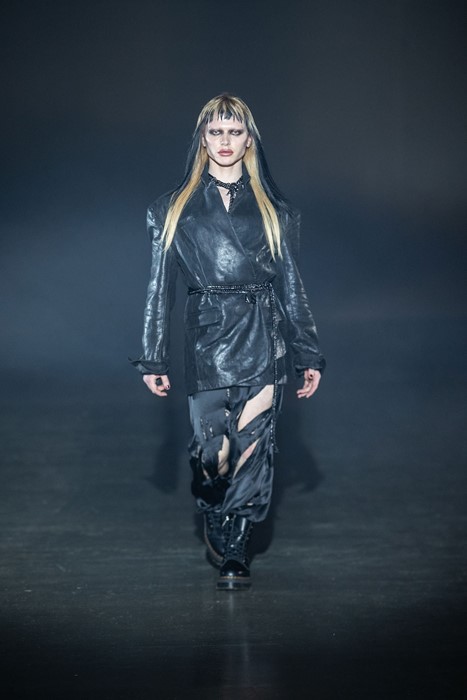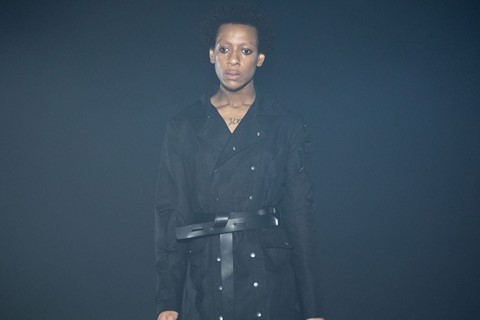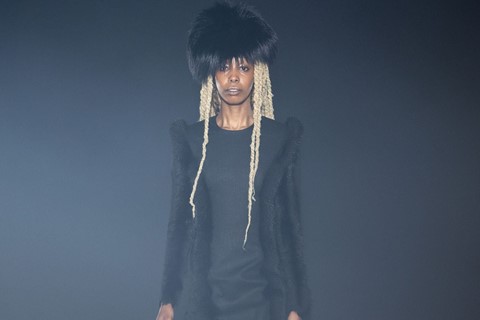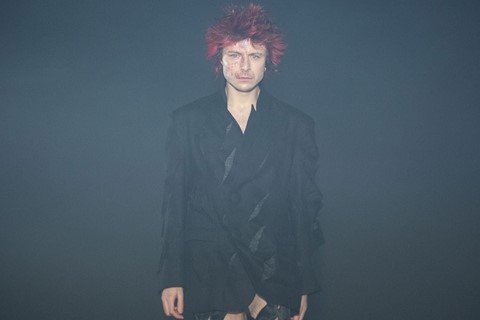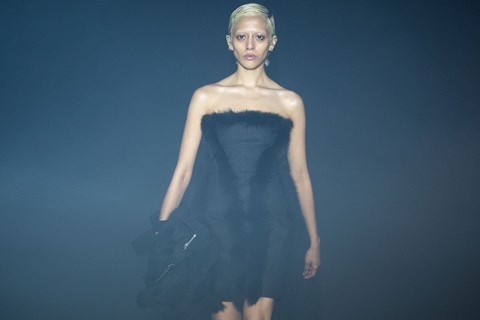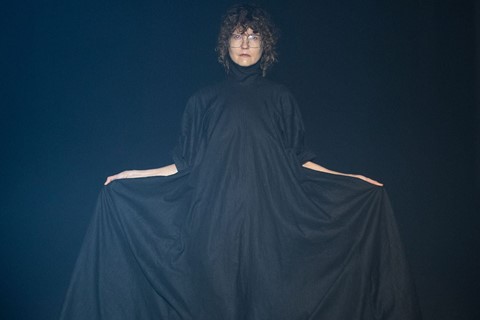Having written for AnOther about walking her first show two years ago, Emily Crooked returns to discuss Art School again, this time as casting director
In January 2019, I walked my first London Fashion Week show for Art School and was lucky enough to write about the experience and how much it meant to me for AnOther. Imagine my sense of beautiful symmetry when I found myself, just over two year later, working with the now-sole creative director Eden Loweth and the founder of London Trans+ Pride and Harpies, Lucia Blayke, as casting directors for the Autumn/Winter 2021 show.
The response to the show was incredible, and, humblingly, the response to the casting in particular. Having two trans people unafraid to saturate the cast with trans and marginalised beauty put the show on a different level of inclusivity – and the press and the community noticed. This is the visibility that is possible when you put marginalised people in control of casting: international press loudly praising the inclusion and diversity, changing public perceptions of trans people for the better. And we did that in the context of the global rise of the political right, constant transphobia in the British press, and governments the world over attacking trans people – everyone involved in the show should be intensely proud of what we achieved. This is how we fight back.
Increasing the level of visibility felt more necessary than ever this season. Without a vibrant queer nightlife scene, our communitiy has been drastically and devastatingly less visible, less connected this last year – both to the public and each other. We have been isolated from each other, unable to work, unable to depend and lean on each other.
Speaking to renowned drag artist, trans activist and Mr Gay England 2021 finalist Chiyo Gomes, someone I’m deeply personally proud to have had in the show, he laments “losing safe spaces and not being able to physically connect with people that truly understand what it’s like to navigate the world through a similar lens. My point is, the world is not safe for us. And this last year has done nothing to soothe the violence we face, or regulate our mental healths ... This last year has basically taken everything that physically aids us in sparking our revolution.”
Coupled with witnessing the murder of more trans people in 2020 than any year recorded before, the last 12 months have been incomparably difficult for the the trans community – particularly the Black trans community.
The fragility of our lives was being pushed in our faces: our community was scattered, our collective mental health was in tatters and we were being forced to confront the death of a trans person in the media on a weekly basis.
With this context, it became clear that this show had to be about hope. The show had to acknowledge the dark time that we are going through, but reaffirm our strength and beauty in spite of it. Queer communities might not exist in the spaces that they used to, but they still exist and are still packed with the most beautiful, incredible people. For Sakeema Crook, a prominent Black trans activist, model and dancer who walked the show, the “pushing [of] visibility for the queer community and featuring the beauty and diversity of what we have to offer was such a healing experience – to walk the runway with people that I know and love gives me unmeasured pride in all that we’ve been through to get to this point.”
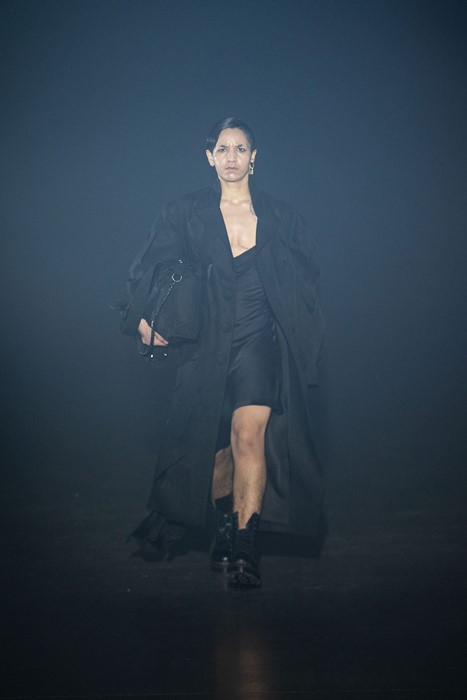
I can’t express what it means to hear that from someone I respect as much as Sakeema – it’s exactly what we were aiming for with the casting. Having had everything taken from us, stared our fragility in the face and had our community dashed, we knew we needed to put out the strongest, most powerful cast we could, as a message of hope to queer people everywhere. In the midst of the fragility and loss, this show and Art School needed to give a sense of permanence and stability. Not only for the queer communtiy to have faith that Art School will continue to platform our community through our most difficult times, but for the fashion industry to know that these queers will not be discarded, that we are here to stay and here to change things.
Our capacity to make significant change is only strengthened by having fashion industry figureheads like Matches Fashion’s Natalie Kingham, all-round industry icon Cozette McCreery and SHOWstudio’s Mimma Viglezio behind us. Talking about the brand, Mimma said, “Art School means the world to me, not only because Eden has become a good friend, or as a mentor, but also and especially for what it stands for in the fashion industry.” For Mimma, Art School is “one of the very few brands that are truly, genuinely and sincerely embracing inclusivity.” To be putting trans, non-binary and disabled models down a runway and have the industry notice and support is incredibly powerful. Art School is expanding what is acceptable on runways; the rules of what you have to “be” to be a model simply don’t apply, what’s far more important is who you are and who you represent. And we want to change who is represented, who feels seen and appreciated in fashion imagery.
This of course meant bringing something new to the casting – new faces, new bodies, not just to Art School but to runways in general. But not new to us: some of these people Lucia and I have known for years, they are the icons of our community, some of the strongest people we know, and the people that our community should be represented by. More than anything, casting our community was about giving the people we love and cherish the time in the spotlight that they deserve.
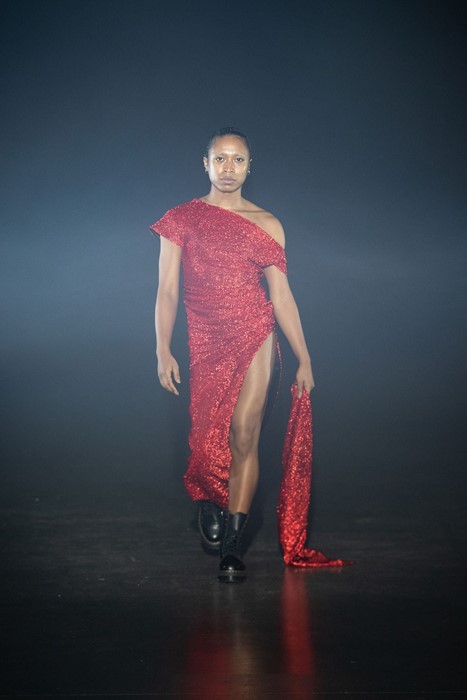
When I spoke to Eden about the collection and this show, this sense of newness surfaced in their thoughts on the season and Art School’s future.
“Ascension marks the start of a new chapter for myself and Art School,” they said. “As my first season alone, it has been deeply humbling and moving to form a new team and a wider support system of friends and mentors. The casting for Autumn/Winter 2021 has brought a new life to Art School and a new faith in myself that we are building something truly special with the right foundations and principles at its core.”
And those foundations and principles were felt by the models: Chiyo felt “we were finally being cherished for the fierce beings that we are,” Sakeema was proud “to be part of something that represents what we as a community are wanting to see,” and both expressed comfort and pride in being placed alongside so many of their chosen family on a runway.
Sakeema called the show “a tangible marker of change,” and it really is. It’s an enormous step towards the normalisation of trans people on runways and in society, and in that sense and enormous step towards improving the safety of trans people. The show sent a message that trans people deserve more. That Black trans people deserve more. Their lives should not be in danger because of who they are – they should be loved, cherished, appreciated and raised up because of who they are.
I’m still reeling from having been involved in such a loud and proud display of hope from a community that has been stifled for so long. To be part of this show of resilience has been incomparable, everyone involved has been part of a moment in queer and trans history. You’re all incredible, be proud.
